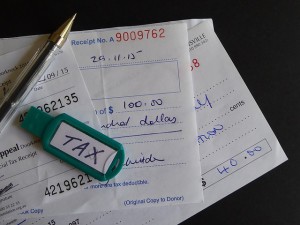When you are getting your financial records organized, it is important to keep track of your spending, and with your spending comes receipts. If you think about a typical shopping trip, it is easy to accumulate several receipts quickly as you shop at different stores, stop for a bite to eat, and fill up your car with gas. Saving receipts can add up to a lot of paper very quickly, so some of the most common questions beginners are faced with is “Which receipts do I have to save?” and “How long do I need to keep them?”
The Four Receipt Criteria
When you make a purchase, you will probably be tempted to crumple up the receipt and throw it in the nearest recycling bin as soon as possible. But before you toss it, go through this mental checklist:
- Will I want to return this purchase later?
- Is this purchase accounting for 10% or more of what I expect to spend this month?
- Do I need this receipt if something breaks?
- Do I want to claim this purchase on my taxes?
This might add an extra second to your transaction time, but that second can add up big time!
Receipts for Returns

This is the easiest decision. In almost every case, you will have a very hard time returning an item to the store if you do not have a receipt to prove you made the purchase. This means that for clothing, appliances, and any item that could be defective or break, you will want to save the receipt.
How long should I save them?
Returns are usually accepted only within 30 to 60 days of the purchase, so you can generally throw these out the next time you do an “account reconciliation” – a few minutes you spend each month making sure there are no errors in your credit card statement or bank balances.
Receipts you are saving in case of returns can also be saved separately from your other more permanent financial records, making it easier to throw them away regularly.
10% Purchase Receipts
If you think this purchase will account for 10% or more of this month’s spending, you should keep the receipt for that month’s account reconciliation. Since the dollar amount spent for these purchases is large, you will want to double-check the receipt against the stated purchase price to make sure you weren’t overcharged.
How long should I save them?
If you do not need these for tax reasons, you can safely throw these away as soon as you finish your account reconciliation.
Warranty Receipts
When you purchase electronics or some types of repairs by a licensed professional, the product or service will often come with a warranty. A “warranty” means they promise nothing will go wrong within some time frame. If something breaks or there is a defect in the warranty period, the manufacturer will usually replace it free of charge.
Warranties cover items such as a new TV or cell phone, car repairs done by a licensed mechanic, a new video game console, and other expensive items.
How long should I save them?
If the product comes with a warranty, you will want to keep the receipt plus proof of the warranty for as long as you own the product. If you have a service performed which comes with a warranty, you will want to keep the service paperwork and warranty for the life of the warranty period. Find a safe place in your home, such as in a filing cabinet, to keep this paperwork organized. You’ll be grateful you have it when something goes wrong.
Tax Purchases

You might be surprised at what types of deductions you can claim on your taxes. Paid any tuition or job training? You can claim it! Did you need to buy something required for work, like a uniform? You can claim that too! Depending on where you live, you might be able to claim what you spent on public transit, improvements to your house, and much more.
If what you bought can be claimed on your taxes, you need to keep your receipts much longer, and it is a lot more important to keep them organized. You’ll be grateful you have it when something goes wrong.
How long should I save them?
If you claim something on your taxes, you need to keep the receipt for at least 7 years. This is the threshold for the IRS to audit your tax filings. Then if the IRS does decide to audit you, you will have the necessary paperwork to show that you made those purchases. At the end of that 7-year period you can ceremoniously throw away all the receipts from 7 years ago to make room for a new batch!
Electronic Receipts
Many retailers now give the option to have receipts emailed to you electronically. If you take this option, you can set up folders in your email account where you can move everything quickly and easily for future reference – without having to worry about paper files.
Try It!
Try matching the following receipts to the category for how long you should save them. Some items can fit in more than one place!
Pop Quiz
[mlw_quizmaster quiz=80]
Challenge Questions
- When was the last time you received a receipt. Did you check it and did you keep it?
- Have you ever received the wrong change?
- Have you ever returned a product to a store. Were you asked for a receipt?
- Why might the IRS expect you to keep receipts?
- How might keeping your receipts help you with your spending plan?
